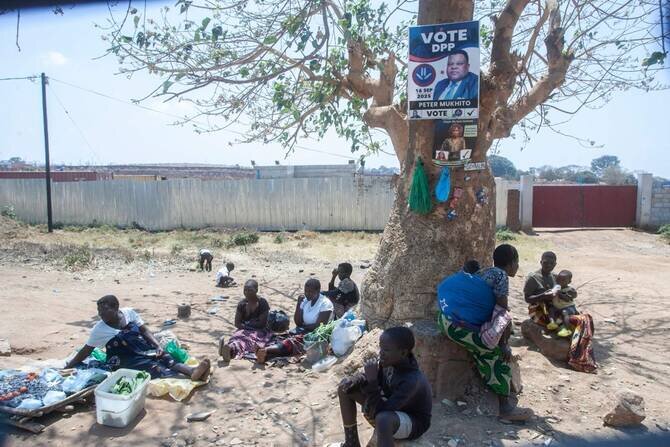
Malawians Vote Amid Economic Despair in Crowded Presidential Election
Incumbent Lazarus Chakwera and former President Peter Mutharika compete in an election overshadowed by economic challenges, with a crowded field of candidates.
LILONGWE, Malawi: Malawians head to the polls on September 16th for a presidential election that is heavily influenced by economic hardships.
The race features several prominent candidates, including incumbent President Lazarus Chakwera and his predecessor, Peter Mutharika.
Despite an unusually high number of contenders—17 in total—the electorate remains skeptical about the potential for meaningful change in one of the world's poorest countries.
Voters express dissatisfaction with the political class, feeling that there is little difference between the ruling party and its main opposition.
Victor Shawa, a 23-year-old unemployed man from Lilongwe, exemplifies this sentiment: "Whether it’s Chakwera or Mutharika, nothing changes for us.
It's like choosing between two sides of the same coin".
Chakwera, a 70-year-old preacher and leader of the Malawi Congress Party (MCP), is seeking re-election after his first term was marked by mixed performances and marred by controversy, including allegations of election rigging.
In contrast, Mutharika, an 85-year-old lawyer from the Democratic Progressive Party (DPP), seeks to regain his former office amidst accusations of economic stagnation, shortages of basic goods, and cronyism during his previous tenure.
According to recent polls, Mutharika leads with 41% support compared to Chakwera's 31%, though neither candidate is expected to secure an outright victory in the first round, necessitating a runoff.
While both major candidates face criticism over their handling of Malawi's economic challenges—ranging from runaway inflation and fuel shortages to corruption scandals—young people like Shawa express disillusionment with the political elite.
They feel that neither Chakwera nor Mutharika has addressed pressing issues such as unemployment, high living costs, and food scarcity.
The election also includes other notable figures such as Joyce Banda, Malawi's first female president, and Vice President Michael Usi, although their prospects for winning appear slim.
Any potential kingmaker role might fall to Dalitso Kabambe, the former Central Bank governor who currently trails in polls.
Despite being overshadowed by economic concerns, external factors such as the COVID-19 pandemic, devastating natural disasters like Cyclone Freddy, and successive droughts have further exacerbated Malawi’s challenges.
Critics argue that these crises highlight the government's lack of strategy rather than providing an excuse for its shortcomings.
Bertha Chikadza, president of the Economics Association of Malawi, emphasizes how basic needs such as food, employment, and stable prices are likely to dominate voting decisions.
The sentiment among young voters is one of desperation; they feel that while they're expected to be the future leaders, the current political class only serves their own interests rather than addressing the pressing issues affecting the youth.
The outcome of this election is significant as Malawians seek a solution to their economic problems in an increasingly crowded and competitive political landscape.
The race features several prominent candidates, including incumbent President Lazarus Chakwera and his predecessor, Peter Mutharika.
Despite an unusually high number of contenders—17 in total—the electorate remains skeptical about the potential for meaningful change in one of the world's poorest countries.
Voters express dissatisfaction with the political class, feeling that there is little difference between the ruling party and its main opposition.
Victor Shawa, a 23-year-old unemployed man from Lilongwe, exemplifies this sentiment: "Whether it’s Chakwera or Mutharika, nothing changes for us.
It's like choosing between two sides of the same coin".
Chakwera, a 70-year-old preacher and leader of the Malawi Congress Party (MCP), is seeking re-election after his first term was marked by mixed performances and marred by controversy, including allegations of election rigging.
In contrast, Mutharika, an 85-year-old lawyer from the Democratic Progressive Party (DPP), seeks to regain his former office amidst accusations of economic stagnation, shortages of basic goods, and cronyism during his previous tenure.
According to recent polls, Mutharika leads with 41% support compared to Chakwera's 31%, though neither candidate is expected to secure an outright victory in the first round, necessitating a runoff.
While both major candidates face criticism over their handling of Malawi's economic challenges—ranging from runaway inflation and fuel shortages to corruption scandals—young people like Shawa express disillusionment with the political elite.
They feel that neither Chakwera nor Mutharika has addressed pressing issues such as unemployment, high living costs, and food scarcity.
The election also includes other notable figures such as Joyce Banda, Malawi's first female president, and Vice President Michael Usi, although their prospects for winning appear slim.
Any potential kingmaker role might fall to Dalitso Kabambe, the former Central Bank governor who currently trails in polls.
Despite being overshadowed by economic concerns, external factors such as the COVID-19 pandemic, devastating natural disasters like Cyclone Freddy, and successive droughts have further exacerbated Malawi’s challenges.
Critics argue that these crises highlight the government's lack of strategy rather than providing an excuse for its shortcomings.
Bertha Chikadza, president of the Economics Association of Malawi, emphasizes how basic needs such as food, employment, and stable prices are likely to dominate voting decisions.
The sentiment among young voters is one of desperation; they feel that while they're expected to be the future leaders, the current political class only serves their own interests rather than addressing the pressing issues affecting the youth.
The outcome of this election is significant as Malawians seek a solution to their economic problems in an increasingly crowded and competitive political landscape.











